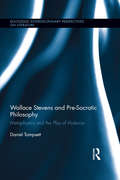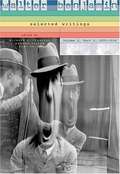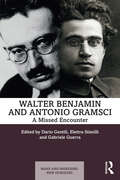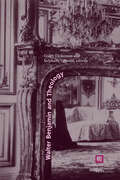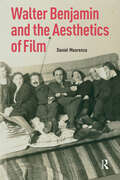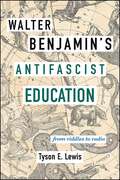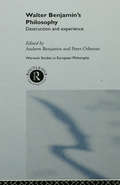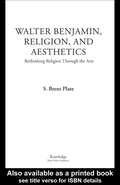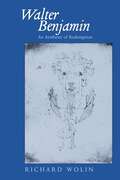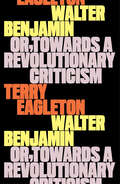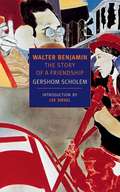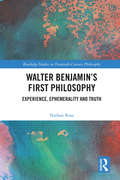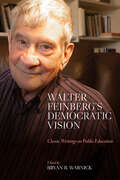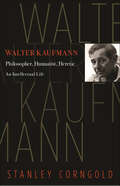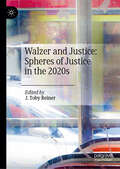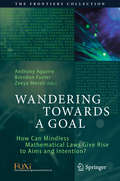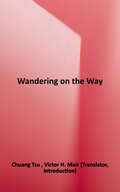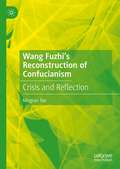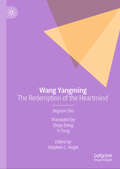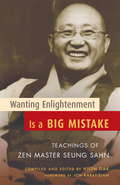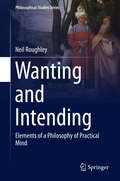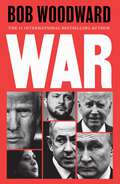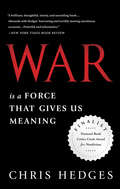- Table View
- List View
Wallace Stevens and Pre-Socratic Philosophy: Metaphysics and the Play of Violence (Routledge Interdisciplinary Perspectives on Literature)
by Daniel TompsettThis book studies Wallace Stevens and pre-Socratic philosophy, showing how concepts that animate Stevens’ poetry parallel concepts and techniques found in the poetic works of Parmenides, Empedocles, and Xenophanes, and in the fragments of Heraclitus. Tompsett traces the transition of pre-Socratic ideas into poetry and philosophy of the post-Kantian period, assessing the impact that the mythologies associated with pre-Socratism have had on structures of metaphysical thought that are still found in poetry and philosophy today. This transition is treated as becoming increasingly important as poetic and philosophic forms have progressively taken on the existential burden of our post-theological age. Tompsett argues that Stevens’ poetry attempts to ‘play’ its audience into an ontological ground in an effort to show that his ‘reduction of metaphysics’ is not dry philosophical imposition, but is enacted by our encounter with the poems themselves. Through an analysis of the language and form of Stevens’ poems, Tompsett uncovers the mythology his poetry shares with certain pre-Socratics and with Greek tragedy. This shows how such mythic rhythms are apparent within the work of Friedrich Nietzsche, Martin Heidegger and Hans-Georg Gadamer, and how these rhythms release a poetic understanding of the violence of a ‘reduction of metaphysics.’
Walter Benjamin - Selected Writings (Volume 2, 1931-1934)
by Gary Smith Walter Benjamin Rodney Livingstone Michael William JenningsIn the frenzied final years of the Weimar Republic, amid economic collapse and mounting political catastrophe, Walter Benjamin emerged as the most original practicing literary critic and public intellectual in the German-speaking world. Volume 2 of the Selected Writings is now available in paperback in two parts. In Part 1, Benjamin is represented by two of his greatest literary essays, "Surrealism" and "On the Image of Proust," as well as by a long article on Goethe and a generous selection of his wide-ranging commentary for Weimar Germany's newspapers. Part 2 contains, in addition to the important longer essays, "Franz Kafka," "Karl Kraus," and "The Author as Producer," the extended autobiographical meditation "A Berlin Chronicle," and extended discussions of the history of photography and the social situation of the French writer, previously untranslated shorter pieces on such subjects as language and memory, theological criticism and literary history, astrology and the newspaper, and on such influential figures as Paul Valery, Stefan George, Hitler, and Mickey Mouse.
Walter Benjamin and Antonio Gramsci: A Missed Encounter (Marx and Marxisms)
by Elettra Stimilli Dario Gentili Gabriele GuerraThis book marks a missed encounter between two of the most influential Marxist thinkers of our age, Walter Benjamin and Antonio Gramsci, studied here for the first time side by side.Benjamin and Gramsci were contemporaries, whose births and deaths took place within a few years of each other in Western Europe in the first half of the twentieth century. Two Marxists sui generis, they radically changed Marxism’s themes and vocabulary, profoundly influencing the most significant analyses and debates. At a time in which Marxism was considered to be outdated and in crisis, both Gramsci’s and Benjamin’s thoughts provided resources for its renewal: particularly in postcolonial studies for Gramsci and in new media studies for Benjamin. Both were victims of fascism, on the threshold of the catastrophe of the Second World War. These two philosophers’ posthumous fortune depended on the transmission of their thought, which was first entrusted to friends and comrades, and then to entire generations of scholars from a wide range of disciplines.Editors, Dario Gentili, Elettra Stimilli, and Gabriele Guerra explore with leading voices on Benjamin and Gramsci the most relevant and topical issues today. The book gives an indispensable new perspective in Marxism for students and researchers alike.
Walter Benjamin and Theology (Perspectives in Continental Philosophy)
by Colby Dickinson and Stéphane SymonsIn the Arcades Project, Walter Benjamin writes that his work is “related to theology as blotting pad is related to ink. It is saturated with it.” For a thinker so decisive to critical literary, cultural, political, and aesthetic writings over the past half-century, Benjamin’s relationship to theological matters has been less observed than it should, even despite a variety of attempts over the last four decades to illuminate the theological elements latent within his eclectic and occasional writings. Such attempts, though undeniably crucial to comprehending his thought, remain in need of deepened systematic analysis. In bringing together some of the most renowned experts from both sides of the Atlantic, Walter Benjamin and Theology seeks to establish a new site from which to address both the issue of Benjamin’s relationship with theology and all the crucial aspects that Benjamin himself grappled with when addressing the field and operations of theological inquiry.
Walter Benjamin and the Aesthetics of Film
by Daniel MourenzaWalter Benjamin is today regarded as one of the leading thinkers of the twentieth century. Often captured in pensive pose, his image is now that of a serious intellectual. But Benjamin was also a fan of the comedies of Adolphe Menjou, Mickey Mouse, and Charlie Chaplin. As an antidote to repressive civilization, he developed, through these figures, a theory of laughter. Walter Benjamin and the Aesthetics of Film is the first monograph to thoroughly analyse Benjamin’s film writings, contextualizing them within his oeuvre whilst also paying attention to the various films, actors, and directors that sparked his interest. The book situates all these writings within Benjamin’s ‘anthropological materialism’, a concept that analyses the transformations of the human sensorium through technology. Through the term ‘innervation’, Benjamin thought of film spectatorship as an empowering reception that, through a rush of energy, would form a collective body within the audience, interpenetrating a liberated technology into the distracted spectators. Benjamin’s writings on Soviet film and German cinema, Charlie Chaplin, and Mickey Mouse are analysed in relation to this posthuman constellation that Benjamin had started to dream of in the early twenties, long before he began to theorize about films.
Walter Benjamin and the Idea of Natural History (Cultural Memory in the Present)
by Eli FriedlanderIn this incisive new work, Eli Friedlander demonstrates that Walter Benjamin's entire corpus, from early to late, comprises a rigorous and sustained philosophical questioning of how human beings belong to nature. Across seemingly heterogeneous writings, Friedlander argues, Benjamin consistently explores what the natural in the human comes to, that is, how nature is transformed, actualized, redeemed, and overcome in human existence. The book progresses gradually from Benjamin's philosophically fundamental writings on language and nature to his Goethean empiricism, from the presentation of ideas to the primal history of the Paris arcades. Friedlander's careful analysis brings out how the idea of natural history inflects Benjamin's conception of the work of art and its critique, his diagnosis of the mythical violence of the legal order, his account of the body and of action, of material culture and technology, as well as his unique vision of historical materialism. Featuring revelatory new readings of Benjamin's major works that differ, sometimes dramatically, from prevailing interpretations, this book reveals the internal coherence and philosophical force of Benjamin's thought.
Walter Benjamin's Antifascist Education: From Riddles to Radio
by Tyson E. LewisWalter Benjamin's Antifascist Education is the first comprehensive analysis of educational themes across the entirety of the critical theorist's diverse writings. Starting with Benjamin's early reflections on teaching and learning, Tyson E. Lewis argues that the aesthetic and cultural forms to which Benjamin so often turned—namely, radio broadcasts, children's theatrical productions, collections, cityscapes, public cinemas, and word games—swell with educational potentialities. What emerges from Lewis's reading is a constellational curriculum composed of minor practices such as poor teaching, absentminded learning, and nondurational studying. This curriculum carries political significance, offering an antidote to past and present forms of fascist manipulation, hardness, and coldness. Walter Benjamin's Antifascist Education is a testimony to Benjamin's belief that "everyone is an educator and everyone needs to be educated and everything is education."
Walter Benjamin's Concept of the Image (Routledge Studies in Twentieth-Century Philosophy)
by Alison RossIn this book, Alison Ross engages in a detailed study of Walter Benjamin’s concept of the image, exploring the significant shifts in Benjamin’s approach to the topic over the course of his career. Using Kant’s treatment of the topic of sensuous form in his aesthetics as a comparative reference, Ross argues that Benjamin’s thinking on the image undergoes a major shift between his 1924 essay on ‘Goethe’s Elective Affinities,’ and his work on The Arcades Project from 1927 up until his death in 1940. The two periods of Benjamin’s writing share a conception of the image as a potent sensuous force able to provide a frame of existential meaning. In the earlier period this function attracts Benjamin’s critical attention, whereas in the later he mobilises it for revolutionary outcomes. The book gives a critical treatment of the shifting assumptions in Benjamin’s writing about the image that warrant this altered view. It draws on hermeneutic studies of meaning, scholarship in the history of religions and key texts from the modern history of aesthetics to track the reversals and contradictions in the meaning functions that Benjamin attaches to the image in the different periods of his thinking. Above all, it shows the relevance of a critical consideration of Benjamin’s writing on the image for scholarship in visual culture, critical theory, aesthetics and philosophy more broadly.
Walter Benjamin's Philosophy: Destruction and Experience (Warwick Studies in European Philosophy)
by Peter Osborne Andrew BenjaminThis collection explores, in Adorno's description, `philosophy directed against philosophy'. The essays cover all aspects of Benjamin's writings, from his early work in the philosophy of art and language, through to the concept of history. The experience of time and the destruction of false continuity are identified as the key themes in Benjamin's understanding of history.
Walter Benjamin, Religion and Aesthetics: Rethinking Religion through the Arts
by S. Brent PlateWalter Benjamin, Religion, and Aesthetics is an innovative and creative attempt to unsettle and reconceive the key concepts of religious studies through a reading with, and against, Walter Benjamin. Constructing what he calls an "allegorical aesthetics," Plate sifts through Benjamin's writings showing how his concepts of art, allegory, and experience undo traditionally stabilizing religious concepts such as myth, symbol, memory, narrative, creation, and redemption.
Walter Benjamin: An Aesthetic of Redemption (Weimar and Now: German Cultural Criticism #7)
by Richard WolinFew twentieth-century thinkers have proven as influential as Walter Benjamin, the German-Jewish philosopher and cultural and literary critic. Richard Wolin's book remains among the clearest and most insightful introductions to Benjamin's writings, offering a philosophically rich exposition of his complex relationship to Adorno, Brecht, Jewish Messianism, and Western Marxism. Wolin provides nuanced interpretations of Benjamin's widely studied writings on Baudelaire, historiography, and art in the age of mechanical reproduction. In a new Introduction written especially for this edition, Wolin discusses the unfinished Arcades Project, as well as recent tendencies in the reception of Benjamin's work and the relevance of his ideas to contemporary debates about modernity and postmodernity.
Walter Benjamin: Or, Towards a Revolutionary Criticism
by Terry EagletonFrom our finest radical literary analyst, a classic study of the great philosopher and cultural theorist.
Walter Benjamin: The Story of a Friendship
by Gershom Scholem Lee Sigel Harry ZohnGershom Scholem is celebrated as the twentieth century's most profound student of the Jewish mystical tradition; Walter Benjamin, as a master thinker whose extraordinary essays mix the revolutionary, the revelatory, and the esoteric. Scholem was a precocious teenager when he met Benjamin, who became his close friend and intellectual mentor. His account of that relationship--which was to remain crucial for both men--is both a celebration of his friend's spellbinding genius and a lament for the personal and intellectual self-destructiveness that culminated in Benjamin's suicide in 1940. At once prickly and heartbroken, argumentative and loving, Walter Benjamin: The Story of a Friendship is an absorbing memoir with the complication of character and motive of a novel. As Scholem revisits the passionate engagements over Marxism and Kabbala, Europe and Palestine that he shared with Benjamin, it is as if he sought to summon up his lost friend's spirit again, to have the last word in the argument that might have saved his life.
Walter Benjamin’s First Philosophy: Experience, Ephemerality and Truth (Routledge Studies in Twentieth-Century Philosophy)
by Nathan RossThis book provides a study of Walter Benjamin’s first philosophy in two senses: it focuses on his early philosophy as a source of insight into his later works, and it explores his thinking about the nature of truth, method, experience, the relation of body and mind, and the limits of human knowledge. While most attention is paid to Benjamin’s later works, his writings from roughly 1914-1925 explore philosophical themes and develop a critical method. This book argues that this early work founds a series of original and lasting questions and insights. Benjamin understands experience as a broken continuum of diverse forms of spiritual expression, each of which is ephemeral. This leads Benjamin to a series of thought figures: the notion of language as a medium of experience; a philosophy of perception based in the natural history of the human body; an emphasis on mimesis as a faculty of creative assimilation; and a discovery of memory as a power for excavation of meaning in past experience. This book demonstrates that the need for a new understanding of the metaphysical structure of experience, as well as a new conception of truth, play a special role in shaping Benjamin’s subsequent work. Walter Benjamin’s First Philosophy will be of interest to scholars and advanced students working on the thought of Walter Benjamin, 20th-century Continental philosophy, comparative literature, and modern German thought.
Walter Feinberg’s Democratic Vision: Classic Writings on Public Education (SUNY series, Horizons in the Philosophy of Education)
by Walter FeinbergCollects Walter Feinberg's classic writings on the meaning of democracy for public education.For over fifty years, Walter Feinberg has been a leader in interpreting democracy in and its meaning for public education. In this collection, Feinberg explores the question of how to study education, the necessary role of history and philosophy in this endeavor, and the need for educational theorists to engage with the lived realities of students, parents, and teachers through philosophical anthropology. He demonstrates a particular way of paying attention to public education that brings an interpretive sensitivity for others to the big philosophical questions of what public schooling should be in democratic societies. Feinberg explores many of the central questions that vex educational policy and practice: What should be the purpose of public schools? What should we think of school choice proposals? What are the relationships between religion and public schools? Should schools promote an American identity? How should we think about affirmative action? In this tour of educational ideas, democracy is the central concern, as it both presents questions that demand answers and becomes an approach to studying education with rigor and sensitivity.
Walter Kaufmann: Philosopher, Humanist, Heretic: An Intellectual Life
by Stanley CorngoldThe first complete account of the ideas and writings of a major figure in twentieth-century intellectual lifeWalter Kaufmann (1921–1980) was a charismatic philosopher, critic, translator, and poet who fled Nazi Germany at the age of eighteen, emigrating alone to the United States. He was astonishingly prolific until his untimely death at age fifty-nine, writing some dozen major books, all marked by breathtaking erudition and a provocative essayistic style. He single-handedly rehabilitated Nietzsche’s reputation after World War II and was enormously influential in introducing postwar American readers to existentialism. Until now, no book has examined his intellectual legacy.Stanley Corngold provides the first in-depth study of Kaufmann’s thought, covering all his major works. He shows how Kaufmann speaks to many issues that concern us today, such as the good of philosophy, the effects of religion, the persistence of tragedy, and the crisis of the humanities in an age of technology. Few scholars in modern times can match Kaufmann’s range of interests, from philosophy and literature to intellectual history and comparative religion, from psychology and photography to art and architecture. Corngold provides a heartfelt portrait of a man who, to an extraordinary extent, transfigured his personal experience in the pages of his books.This original study, both appreciative and critical, is the definitive intellectual life of one of the twentieth century’s most engaging yet neglected thinkers. It will introduce Kaufmann to a new generation of readers and serves as a fitting tribute to a scholar’s incomparable libido sciendi, or lust for knowledge.
Walzer and Justice: Spheres of Justice in the 2020s
by J. Toby ReinerThe book offers a collection of essays that reinterpret and reimagine Michael Walzer&’s classic work Spheres of Justice as an important contribution to political theorizing about justice in the 2020s. It highlights the social-democratic nature of Walzer&’s theory of justice as a significant aid to rethinking egalitarian politics today, as well as some of the deeper structural elements of the theory, such as Walzer&’s interpretivism and pluralism. As a result, it both offers the most wide-ranging and up-to-date account of this important book and rethinks some of the major contributions that it has made to political theory and philosophy. Contributors include several senior scholars who are among Walzer&’s foremost and most long-standing interlocutors, as well as some of the younger scholars who have done important work in Walzer studies. The volume will stand alongside Palgrave Macmillan&’s Walzer and War as a crucial companion to Walzer&’s other major book, Just and Unjust Wars.
Wandering Towards a Goal: How Can Mindless Mathematical Laws Give Rise To Aims And Intention? (The Frontiers Collection)
by Anthony Aguirre Brendan Foster Zeeya MeraliThis collection of prize-winning essays addresses the controversial question of how meaning and goals can emerge in a physical world governed by mathematical laws. What are the prerequisites for a system to have goals? What makes a physical process into a signal? Does eliminating the homunculus solve the problem? The three first-prize winners, Larissa Albantakis, Carlo Rovelli and Jochen Szangolies tackle exactly these challenges, while many other aspects (agency, the role of the observer, causality versus teleology, ghosts in the machine etc.) feature in the other award winning contributions. All contributions are accessible to non-specialists.These seventeen stimulating and often entertaining essays are enhanced versions of the prize-winning entries to the FQXi essay competition in 2017.The Foundational Questions Institute, FQXi, catalyzes, supports, and disseminates research on questions at the foundations of physics and cosmology, particularly new frontiers and innovative ideas integral to a deep understanding of reality, but unlikely to be supported by conventional funding sources.
Wandering on the Way: Early Taoist Tales and Parables of Chuang Tzu
by Tzu ChuangIn this vivid, contemporary translation, Victor Mair captures the quintessential life and spirit of Chuang Tzu while remaining faithful to the original text.
Wang Fuzhi’s Reconstruction of Confucianism: Crisis and Reflection
by Mingran TanWang Fuzhi (1619-1692), a Ming loyalist, was forced to find solutions for both cultural and political crises of his time. In this book Mingran Tan provides a comprehensive review of Wang Fuzhi’s understanding of historical events and his interpretation of the Confucian classics. Tan explains what kind of Confucian system Wang Fuzhi was trying to construct according to his motto, “The Six Classics require me to create something new”. He sought a basis for Confucian values such as filial piety, humanity and ritual propriety from political, moral and cosmological perspectives, arguing that they could cultivate a noble personality, beatify political governance, and improve social and cosmological harmony. This inspired Wang Fuzhi’s attempt to establish a syncretic blend of the three branches of Neo-Confucianism, i.e., Zhu Xi’s (1130-1200) philosophy of principle , Wang Yangming’s (1472-1529) philosophy of mind and Zhang Zai’s (1020-1077) philosophy of qi (material force). The most thorough work on Wang Fuzhi available in English, this study corrects some general misunderstanding of the nature of Wang Fuzhi’s philosophy and helps readers to understand Wang Fuzhi from an organic perspective. Building upon previous scholars’ research on Wang Fuzhi’s notion of moral cultivation, Tan gives a comprehensive understanding of how Wang Fuzhi improves social and cosmological harmony through compliance with Confucian rituals.
Wang Yangming: The Redemption of the Heartmind
by Jingnan ShuThis book offers a dynamic portrayal of the preeminent Neo-Confucian Wang Yangming's philosophy of the heartmind. Through the life and times of this prodigious Ming Dynasty figure, from his early literary achievements and pursuit of Buddhist and Daoist ideals to his later success in warfare, virtuous leadership, and tragic struggle against dynastic corruption, the author traces the many stages of the development and application of Wang’s Confucian thinking. Its systematic study of the context through which Wang’s thought matured and was received includes detailed accounts of his inheritance of earlier heartmind philosophy and his pedagogical as well as personal relations with many distinguished disciples. A concise edition of the author’s three-volume Biography of Yangming: The Redemption of Mind, this book draws on a wealth of new information to overturn the traditional understanding of Wang Yangming that dominated the past 500 years.
Wanting Enlightenment Is a Big Mistake: Teachings of Zen Master Seung San
by Seung Sahn Hyon Gak SunimA major figure in the transmission of Zen to the West, Zen Master Seung Sahn was known for his powerful teaching style, which was direct, surprising, and often humorous. He taught that Zen is not about achieving a goal, but about acting spontaneously from "don't-know mind." It is from this "before-thinking" nature, he taught, that true compassion and the desire to serve others naturally arises. This collection of teaching stories, talks, and spontaneous dialogues with students offers readers a fresh and immediate encounter with one of the great Zen masters of the twentieth century.
Wanting and Intending
by Neil RoughleyThis book aims to answer two simple questions: what is it to want and what is it to intend? Because of the breadth of contexts in which the relevant phenomena are implicated and the wealth of views that have attempted to account for them, providing the answers is not quite so simple. Doing so requires an examination not only of the relevant philosophical theories and our everyday practices, but also of the rich empirical material that has been provided by work in social and developmental psychology. The investigation is carried out in two parts, dedicated to wanting and intending respectively. Wanting is analysed as optative attitudinising, a basic form of subjective standard-setting at the core of compound states such as 'longings', 'desires', 'projects' and 'whims'. The analysis is developed in the context of a discussion of Moore-paradoxicality and deepened through the examination of rival theories, which include functionalist and hedonistic conceptions as well as the guise-of-the-good view and the pure entailment approach, two views popular in moral psychology. In the second part of the study, a disjunctive genetic theory of intending is developed, according to which intentions are optative attitudes on which, in one way or another, the mark of deliberation has been conferred. It is this which explains intention's subjection to the requirements of practical rationality. Moreover, unlike wanting, intending turns out to be dependent on normative features of our life form, in particular on practices of holding responsible. The book will be of particular interest to philosophers and psychologists working on motivation, goals, desire, intention, deliberation, decision and practical rationality.
War
by Bob WoodwardChosen by WATERSTONES as one of their BEST POLITICS BOOKS of 2024 Two-time Pulitzer prize winner Bob Woodward tells the revelatory, behind-the-scenes story of three wars – Ukraine, the Middle East and the struggle for the American presidency.War is an intimate and sweeping account of one of the most tumultuous periods in presidential politics and American history. We see President Joe Biden and his top advisers in tense conversations with Russian president Vladimir Putin, Israeli prime minister Benjamin Netanyahu and Ukrainian president Volodymyr Zelensky. We also see Donald Trump, conducting a shadow presidency and seeking to regain political power. With unrivalled, inside-the-room reporting, Woodward shows President Biden&’s approach to managing the war in Ukraine, the most significant land war in Europe since World War II, and his tortured path to contain the bloody Middle East conflict between Israel and the terrorist group Hamas. Woodward reveals the extraordinary complexity and consequence of wartime back-channel diplomacy and decision-making to deter the use of nuclear weapons and a rapid slide into World War III. The raw cage-fight of politics accelerates as Americans prepare to vote in 2024, starting between President Biden and Trump, and ending with the unexpected elevation of Vice President Kamala Harris as the Democratic nominee for president.War provides an unvarnished examination of the vice president as she tries to embrace the Biden legacy and policies while beginning to chart a path of her own as a presidential candidate. Woodward&’s reporting once again sets the standard for journalism at its most authoritative and illuminating.
War Is a Force that Gives Us Meaning
by Chris Hedges<p>As a veteran war correspondent, Chris Hedges has survived ambushes in Central America, imprisonment in Sudan, and a beating by Saudi military police. He has seen children murdered for sport in Gaza and petty thugs elevated into war heroes in the Balkans. Hedges, who is also a former divinity student, has seen war at its worst and knows too well that to those who pass through it, war can be exhilarating and even addictive: “It gives us purpose, meaning, a reason for living.” <p>Drawing on his own experience and on the literature of combat from Homer to Michael Herr, Hedges shows how war seduces not just those on the front lines but entire societies—corrupting politics, destroying culture, and perverting basic human desires. Mixing hard-nosed realism with profound moral and philosophical insight, <i>War Is a Force that Gives Us Meaning</i> is a work of terrible power and redemptive clarity whose truths have never been more necessary.</p>
